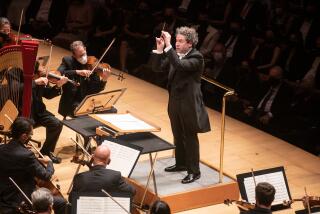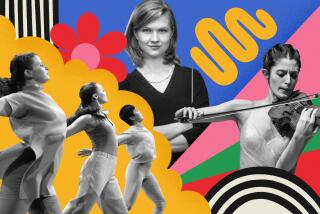PBS Hooks Into the Appeal of ‘Great Composers’
- Share via
When Paul McCartney set out to write his first classical score, the “Liverpool” Oratorio, he told reporters that he tried sticking with classical music programs on the telly for a minute or two instead of clicking right past them as usual. But he rarely remained interested. And that was in England. Things are worse here. Turn to PBS and what you’re likely to get is either boring, Bocelli or, as in last year’s Bernstein documentary, botched.
But now PBS and the BBC have joined forces to try to sell classical music more efficiently to the general public with “Great Composers,” a series of informative, engrossing and occasionally exhilarating hourlong documentaries. Working through Bach, Mozart, Beethoven, Wagner, Mahler, Tchaikovsky and Puccini, these shows galvanized large numbers of British viewers a year ago. Tonight, KCET begins a three-week presentation with a Mozart-Beethoven double bill; Wagner and Mahler the following Wednesday; Tchaikovsky and Puccini the next week. Inexplicably, the American series skips Bach.
There will be much for music lovers to celebrate and to quibble about. Tchaikovsky and Puccini were selected more for their popularity than their greatness or influence. Some, though not me, will object to Mahler being so canonized. The programs themselves--six different directors were involved--vary considerably, even though they all follow the same format.
Each begins with a hook. In tonight’s Mozart installment, conductor Colin Davis need only say that he enjoys Mozart’s music as he enjoys no other, and I was drawn in. However, Stephen Hawking claiming that no one before or after Wagner composed music with comparable emotional effect is a meaningless gimmick.
It hardly requires a rocket scientist to understand that what is most persuasive is the music. The pianists Charles Rosen (for Bach and Beethoven) and Steven Levin (Mozart) take us irresistibly inside the composers’ works. Conductors Michael Tilson Thomas (Beethoven and Mahler) and Valery Gergiev (Tchaikovsky) are gripping advocates. Others widen the point of view. The novelist and cultural critic George Steiner is excellent in putting Wagner’s anti-Semitism in perspective; the directors Ken Russell (Mahler and Tchaikovsky) and Jonathan Miller (Mozart and Puccini) are always good for enlivening any discussion. Puccini’s neighbors dish the stingy, womanizing composer.
There is less consistent value in the choices of musical examples. We glimpse interesting Mozart and Wagner opera productions, but some Wagner operas and all of the Puccinis are represented by stagy studio sets, gauzy camera work and uninspired singing. It is downright perverse to have so much of the Wagner conducted by early music specialist Roger Norrington and claustrophobic to have Georg Solti as the sole Mahler conductor. Puccini is done especially on the cheap musically. But Mozart, Beethoven and Tchaikovsky cast their musical net widely and well.
Taking a cue from popular travel programs, we are whisked here and there, soaking up local color while our tour guide, Kenneth Branagh, in his best BBC voice, provides the off-camera narration.
As for the missing Bach installment, it happens to be a superior introduction to some of the greatest music ever written, and it was designed to set the tone for the whole series. But PBS, stingy as Puccini, will make you buy it (a home video version of the full set is marketed by PBS and will be commercially released next month by Warner Vision/NVC Arts).
The network further undercuts the value of the programs with garish hard-sell. Mahler, for instance, ends with the comment that his transcendent music reflects what it is to be a human being, but PBS interrupts the final, moving music with Tchaikovsky and Puccini plugs. Perish the thought that these programs could inspire you to switch off the tube and listen to a CD.
* “Great Composers,” 9 p.m. Wednesdays, through April 28, KCET.
More to Read
The biggest entertainment stories
Get our big stories about Hollywood, film, television, music, arts, culture and more right in your inbox as soon as they publish.
You may occasionally receive promotional content from the Los Angeles Times.











